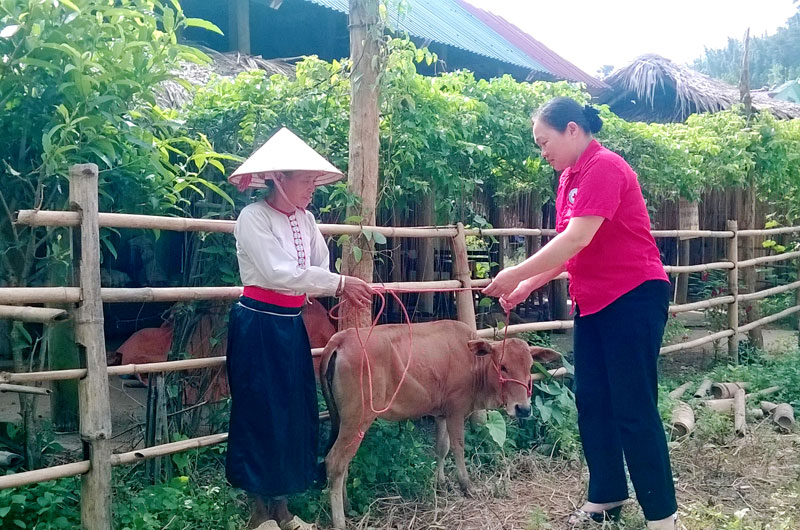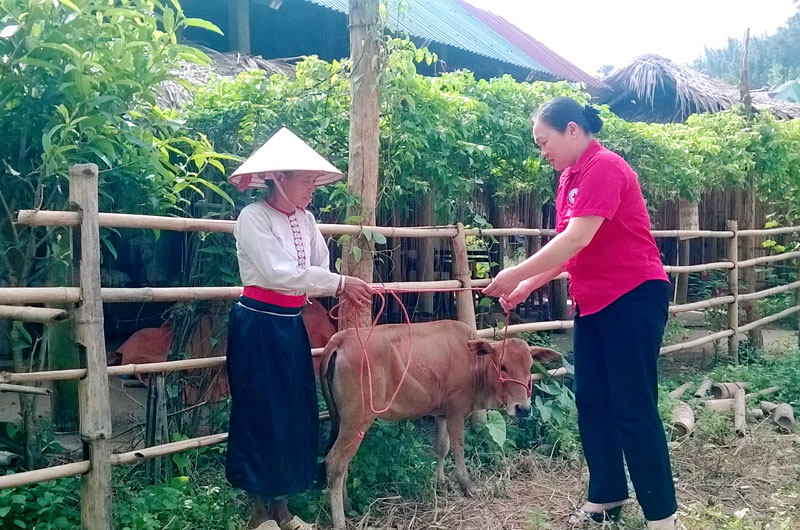
(HBO) - Giap Dat is a heavily disadvantaged commune in Da Bac district. It houses eight hamlets and 501 households of four ethnic groups. The Tay and Dao ethnic groups account for 81.5 percent and 15.6 percent of the commune’s total population, respectively. Local people mainly depend on agricultural production, which has been facing various difficulties; hence the high rate of poor households. By the end of 2018, the rate was 46.67 percent.

Representative of a poor family in Dat 4 hamlet, Giap Dat commune (Da
Bac), receives breeding cows from a charity programme.
In the past years, with support
from different development projetcs, particularly Program 135, Giap Dat’s socio-economic
growth has progressed. Under a programme on assisting production development in
2017 and 2018, 28 local poor families were assigned to take care of seven
breeding cows.
Giap Dat has also received
capital to invest in local socio-economic infrastructure projects, including an
800m road leading to the Suoi Cuom production area and a 150m canal in Dat 3
hamlet. The road project cost a total of 927 million VND, of which local people
donated 27 million VND. The figures for the canal project were 500 million VND
and 50 million VND, respectively. Local people also contributed hundreds of
working days to both projects.
In addition, following the motto "the State
and people work together", the commune has maintained and repaired sewers
and roads in Dat 4 hamlet as well as the Na Ria ditche in Dat 3 hamlet. It has
also implemented a production support programme, providing nearly 70,000 saplings
of wood trees to 56 poor households of four hamlets – Dat 1, 2, 3 and 5.
The emulation movement "Hoa Binh joining hands to build new-style rural areas” has been widely spreading, becoming a driving force that motivates the localities to renew rural landscapes and improve the material and spiritual lives of the residents. In this movement, the people play a central role-both as the main implementers and direct beneficiaries of its outcomes.
In response to the global digital revolution, Hoa Binh Newspaper is transforming itself into a modern and multi-platform media hub, blending cutting-edge technology with a restructured newsroom and a new generation of tech-savvy journalists.
Hoa Binh province’s Association of the Elderly recently held a conference to review the project on expanding the inter-generation self-help club model until 2025.
In a move to implement Resolution No. 57-NQ/TW, issued on December 22, 2024 by the Politburo, which targets breakthroughs in science-technology development, innovation, and digital transformation, the Hoa Binh provincial Department of Health has issued a plan to roll out the "Digital Literacy for All” campaign within the local health sector.
An Nghia Commune (Lạc Sơn District) is one of the communes that achieved the tha standard of the national new rural area in 2018. Entering a new development phase, the commune is now trying to meet the criteria for the advanced new rural development. With the strong political will and the public consensus, the commune is gradually overcoming the challenges to reach this goal, aiming for the sustainable development.



